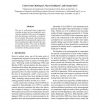13 search results - page 2 / 3 » A Feature-Rich Constituent Context Model for Grammar Inducti... |
ACL
2009
13 years 3 months ago
2009
We investigate the task of unsupervised constituency parsing from bilingual parallel corpora. Our goal is to use bilingual cues to learn improved parsing models for each language ...
JMLR
2010
13 years 24 days ago
2010
Inducing a grammar from text has proven to be a notoriously challenging learning task despite decades of research. The primary reason for its difficulty is that in order to induce...
EMNLP
2011
12 years 5 months ago
2011
We show that categories induced by unsupervised word clustering can surpass the performance of gold part-of-speech tags in dependency grammar induction. Unlike classic clustering ...
NIPS
2008
13 years 7 months ago
2008
We present a novel method for inducing synchronous context free grammars (SCFGs) from a corpus of parallel string pairs. SCFGs can model equivalence between strings in terms of su...
NAACL
2010
13 years 3 months ago
2010
The use of well-nested linear context-free rewriting systems has been empirically motivated for modeling of the syntax of languages with discontinuous constituents or relatively f...

